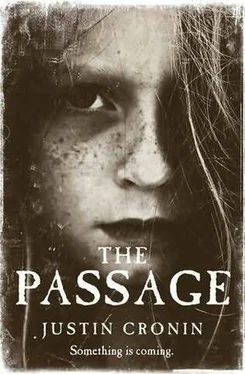“Now, I know it’s under here someplace,” Auntie was saying.
She had lowered herself to her knees, pulling the skirt of the bed aside to look beneath it. With a grunt she reached under the bed and withdrew a box, sliding it across the floor. “Help me up, Peter.”
He took her by an elbow and eased her to her feet, then lifted the box from the floor. An ordinary cardboard shoe box, with a hinged lid and a flap that sealed it tight.
“Go on now.” Auntie was sitting on the edge of the bed, her naked feet dangling like a Little’s, skimming the floor. “Open it.”
He did as she’d said. The box was full of folded paper-he had already figured that out. But not just paper, he saw. Maps.
The box was full of maps.
Carefully he lifted the first one free of the box. Its surface was worn smooth, so brittle at its creases he worried that it might dissolve in his hands. At the top were the words AUTOMOBILE CLUB OF AMERICA, LOS ANGELES BASIN AND SOUTHERN CALIFORNIA.
“These were my father’s. The ones he used on the Long Rides.”
He gently withdrew the others, placing each on top of the bureau. SAN BERNARDINO NATIONAL FOREST. LAS VEGAS STREET ATLAS. SOUTHERN NEVADA AND ENVIRONS. LONG BEACH, SAN PEDRO AND THE PORT OF LOS ANGELES. CALIFORNIA DESERT REGION, MOJAVE NATIONAL PRESERVE. And, at the bottom, its folded edges squeezed against the sides of the box: FEDERAL EMERGENCY MANAGEMENT AGENCY, MAP OF THE CENTRAL QUARANTINE ZONE.
“I don’t understand,” he said. “Where did you get them?”
“Your mother brought them to me. Before she died.” Auntie was still watching him from the bed, her hands resting in her lap. “That woman knew you better than you know yourself. Give them to him when he’s ready, she said.”
A familiar sadness washed over him. “I’m sorry, Auntie,” he said after a moment. “You’ve made a mistake. She must have meant Theo.”
But she shook her head. “No, Peter.” She smiled a toothless smile; her vaporous cloud of hair, backlit by the spots pouring down outside the windows, seemed to glow around her face-a halo of hair and light. “It was you. She told me to give them to you.”
Later Peter would think: how strange it was. How, standing in the quiet of Auntie’s room, among her things of the past, he had felt time opening before him, like the pages of a book. He thought of his mother’s final hours-of her hands, and the close heat of the bedroom where Peter had cared for her; of her sudden struggle for breath, and the last imploring words she’d spoken. Take care of your brother, Theo. He’s not strong, like you . Her intentions had seemed so clear. And yet as Peter searched this moment, the memory began to shift, his mother’s words forming a new shape and emphasis and, with that, a different meaning entirely.
Take care of your brother Theo .
His thoughts were broken by a burst of knocking from the porch.
“Auntie, are you expecting anyone?”
The old woman frowned. “At this hour?”
Peter quickly returned the maps to the box and slid them beneath the bed. It wasn’t until he reached the front door and saw Michael standing behind the screen that he wondered why he’d done this. Michael eased himself into the room, darting a glance past Peter to the old woman, who was standing behind him, her arms folded disapprovingly over her chest.
“Hey, Auntie,” he said breathlessly.
“Hey yourself, rude boy. You come knocking at my door in the middle of the night, I expect a how-do-you-do.”
“Sorry.” His cheeks reddened with embarrassment. “How are you this evening, Auntie?”
She nodded. “I’m expecting I’m all right.”
Michael directed his attention to Peter again, lowering his voice confidentially. “Could I speak to you? Outside?”
Peter stepped onto the porch behind Michael, in time to see Dale Levine appearing out of the shadows.
“Tell him what you told me,” said Michael.
“Dale? What is it?”
“Look,” the man said, glancing around nervously, “I probably shouldn’t be saying this, and I have to get back to the Wall. But if you’re planning on getting Alicia and Caleb out of here, I’d do it at first light. I can help you at the gate.”
“Why? What’s happened?”
It was Michael who answered. “The guns, Peter. They’re going to get the guns.”
In the Infirmary, Sara Fisher, First Nurse, was waiting with the girl.
Amy, Sara thought. Her name was Amy. This impossible girl, this one-hundred-year-old girl, was named Amy. Is that you? she’d asked her. Is that your name? Are you Amy?
Yes , her eyes said. She might have actually smiled. How long since she had heard the sound of her name? That’s me. I’m Amy .
Sara wished she had some clothing for the girl, instead of the gown. It didn’t seem right for a girl who had a name not to have clothing to wear, and a pair of shoes. Sara should have thought of that before returning to the Infirmary. The girl was shorter than she was, lighter-boned and slimmer-hipped, but Sara had a pair of gaps she liked to ride in, snug at the waist and seat, that would fit the girl well enough if she cinched them tight. She needed a bath, too, and a haircut.
Sara didn’t question anything Michael had told her. Michael was Michael, that’s what everyone said, meaning he was too smart by half-too smart for his own good. But the one thing he wasn’t, not ever, was wrong. There would come a time, Sara supposed, when this would happen-a person couldn’t be right all the time-and she wondered what would become of her brother on that day. The ceaseless effort he applied to being right, to fixing every problem, would suddenly collapse inside him. It made Sara think of a game they had played as Littles, building towers of blocks and then pulling them away from the lower tiers, one by one, daring the whole thing to fall; and when it fell, it happened swiftly, all at once. She wondered if that’s what would happen to Michael, if there would be any part left standing. He would need her then, as he had needed her that morning in the shed when they’d found their parents-the day when Sara had failed him.
Sara had meant it, when she’d told Peter she wasn’t afraid of the girl. She had been, at first. But as the hours and then days had moved by, the two of them locked away, she’d begun to feel something new. In the girl’s watchful and mysterious presence-silent and unmoving, and yet not-she’d begun to feel a quality of reassurance, even of hope. A feeling that she was not alone, but even more: that the world was not alone. As if they were all waking from a long night of terrible dreams to step back into life.
Dawn would soon come. The attack of the night before had evidently not repeated; Sara would have heard the shouts. It was as if the night were holding the last of its breath, waiting for what would come next. Because what Sara hadn’t told Peter, or anyone at all, was what had occurred in the Infirmary in the moments just before the lights had gone out. The girl had suddenly sat bolt upright on her cot. Sara, exhausted, had just lain down to sleep; she was roused by a sound she realized was coming from the girl. A low moaning, a single continuous note, rising at the back of her throat. What is it? Sara said, rising quickly to go to her. What’s wrong? Are you hurt, has something hurt you? But the girl gave no reply. Her eyes were very wide, and yet she seemed not to see Sara at all. Sara had sensed that something was happening outside-the room was strangely dark, there were shouts coming from the Wall, the sounds of a commotion, voices calling and feet racing past-but while this seemed important, a fact worthy of her attention, Sara could not look away; whatever was going on outside was being waged here also, in this room, in the vacancy of the girl’s eyes and the tautness of her face and throat and in the mournful melody that she was playing from somewhere deep within her. Things continued this way for some unknown numbers of minutes-two minutes and fifty-six seconds, according to Michael, though it felt like an eternity-and then, as quickly and alarmingly as it had begun, it was over; the girl fell silent. She lay back down on the cot, pulling her knees to her chest, and that had been the end of it.
Читать дальше












